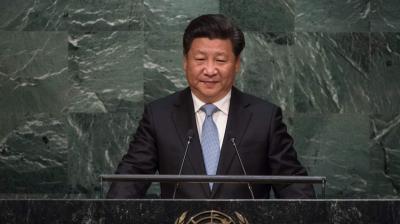This op-ed was originally published in Dutch in NRC Handelsblad on 20 March 2020.
Anyone who looks around the world and thinks through the long-term consequences of the crisis will be aware that coronavirus policy is culturally determined, involves key political choices, and that the crisis represents a defining moment for European politics.
When the coronavirus still appeared to be an exclusively Chinese problem, a Chinese colleague sent me photographs of the face masks that he was no longer able to obtain in China. Could I please order them and send them from the Netherlands? After some investigation on the internet I wrote to tell him that in my opinion the face masks in the photographs would not protect him against the virus. No, he messaged back, the advice in China is that even wearing a simple face mask helps. A few months later the official Dutch advice to ordinary citizens is still that it is a myth that wearing a face mask helps against the virus.
A billion Chinese who believe in myths? “Maybe it’s a matter of culture,” my Chinese colleague suggested. It lasted a while before the penny dropped with me: the Chinese wear face masks also, and maybe even predominantly, so as not to infect others (a simple face mask does actually help with that), whereas the Dutch do so mainly to avoid being infected (that requires an FFP2 mask). In the Netherlands we view protection mainly from the individual perspective, whereas the Chinese see it also from the collective perspective. Everyone wears a mask in case he or she is sick.
"As the pandemic spreads around the world it is increasingly clear that culture matters when it comes to the coronavirus."
As the pandemic spreads around the world it is increasingly clear that culture matters when it comes to the coronavirus. It is a question not only of an individual or collective perspective, but also of a long-term versus a short-term orientation. Now that China seems to be bringing the virus under control to some extent and President Xi Jinping is appearing in public again, is stressing not only the ‘People’s War’ against the virus but also the long-term goal of eradicating poverty in China. That must not be jeopardised by the aftershocks of the crisis.
Cultures also vary in the extent to which they accept uncertainty. A narrative of building up herd immunity, by allowing a majority of the population to go through the disease in a dosed manner, would be an unthinkable narrative for an uncertainty-averse culture such as Italy, for example. In contrast, the leaders of the United Kingdom (low score for uncertainty-aversion) and the Netherlands (medium score, witness also the fiercer reaction to the herd immunity narrative) initially publicly defended such a strategy.
The Dutch social psychologist Geert Hofstede, who died recently, highlighted this and other cultural differences in his world-famous research Culture’s Consequences, emphasising how we are culturally ‘coded’ from a young age. Reactions are often a reflex, and that reflex is culturally determined. Divergent cultural programming is clearly so dominant that even exact scientists cannot escape it – hence the disparate advice on face masks from Chinese and Dutch experts.
In recent weeks we have heard historic speeches from government leaders and heads of state, among them Dutch Prime Minister Mark Rutte on 16 March. One of his core messages was that Dutch policy is based on scientific insights. In the reviews that followed immediately afterwards commentators praised the Prime Minister's speech because it was “fact-based” and “above party politics”.
That was also Rutte's role as half of the population in the Netherlands looked at the live broadcast. Here was a statesman – with authority underpinned by science – setting out the Dutch approach. But politics does matter when it comes to the coronavirus. Virological and epidemiological knowledge is crucial, but political considerations also play a part in policy responses.
"Virological and epidemiological knowledge is crucial, but political considerations also play a part in policy responses."
We can identify various dimensions when assessing political viewpoints: cultural, left-right and unilateral-multilateral dimensions. The cultural dimension recognises the huge political importance of the collective orientation (communitarians) or individual orientation (individualists) mentioned previously. Although all leaders call for solidarity at times of major crisis, there are clear differences between the political reactions of communitarians and individualists in Europe. There are governments, such as those of Spain, Italy and France, that threaten steep fines for endangering the community, whereas Britain, for example, has responded by emphasising personal responsibility. Leaders such as the Italian premier Giuseppe Conte, Hungary's Viktor Orbán, but also the Danish premier Mette Frederiksen – a sociodemocratic communitarian – put great emphasis on the boundaries of the national community, whereas in the Dutch narrative controlling the national border is less significant.
Second, there is the left-right dimension, which will be of great importance when it comes to dealing with the economic and social aftershocks. We had a foretaste of this in the Netherlands when Economy Minister Eric Wiebes commented in a television interview that self-employed people had “consciously taken that risk” and could not count on extra financial support from the government. The storm of criticism that followed showed that not everyone saw self-employment as a free choice for ‘entrepeneurship’. On the contrary, in neoliberal times many people working in e.g. health care, media, and in the catering industry have been pushed into the ‘flexible shell’ of our economy against their will, they often lost their fixed contracts and only rent out their own labour. To support people in need, the Dutch coalition government therefore devised special measures for this group. This income support without conditions to self-employed people (who did not pay premiums and in quite some cases not even taxes) now triggers commentators to plead for a revision altogether of the neoliberal model relying on many flexible workers.
A third dimension – unilateralism versus multilateralism – concerns the extent to which politicians seek to collaborate. Unilateralism was dominant in countries’ initial responses, with Germany and France, among others, banning exports of face masks, various countries closing internal Schengen borders, and Donald Trump reported to offer a German company a deal to acquire a vaccine for the United States. Every government focused primarily on its own people.
"China-watchers expect China to try to increase its influence in multilateral organisations that are playing an important role in this crisis."
The Chinese are a stage further on in the crisis and, amid much media attention, are sending millions of face masks to European countries. China-watchers expect China to try to increase its influence in multilateral organisations that are playing an important role in this crisis, such as the World Health Organization. Multilateralism with Chinese characteristics, in other words. Which country (or group of countries) will set an international example by taking an effective domestic approach to the crisis, and thereby gain the legitimacy to coordinate a global approach to the crisis and achieve global public goods, such as conquering the pandemic and curbing a global recession? If the United States does not swiftly rise above its America First reflex, the coronavirus crisis may catalyse the geopolitical rivalry between the United States and China, triggering a shock that shifts the tectonic plates of today's world order.
Why is it important to understand the culture and politics of the coronavirus crisis? For at least three reasons.
First, we can learn. I think back to a trip to Ethiopia, two months ago. When I landed at Addis Ababa airport, I first had to have my temperature taken before I showed my passport. My initial thought was: what a long line! But now I no longer think of it as wasted time. After all, if a virus is known to be circulating abroad but has not yet reached the Ethiopian population, it is logical to check the health of everyone who wants to cross that border. The newspapers already carry countless articles on how other countries are tackling the fight against the virus. People want to gather information and learn. Governments must do that more systematically too. Initial cultural reflexes are logical, but reflexion on the pros and cons of various approaches is critical in the light of the enormity of the pressure on national health care systems.
Second, ‘healthy’ politicisation of coronavirus policy is necessary given the painful choices that lie ahead. ‘Fact-based policy’ and ‘a policy based on science’ are words you can safely hide behind, so you do not have to account for those choices yet. Every political party has a duty to set out what it considers to be of value according to its tradition, how that will come under pressure as a result of this crisis and the subsequent aftershocks, and what we need to do. The focus needs to be not only on the short term but also on the long-term economic and social consequences. Recognising that there are uncertainties and plurality in science and explaining the rationale for advice actually protects the status of experts. Core values and political choices need to be defended if policy is to have long-term legitimacy. The price of excessive depoliticisation (‘there is no alternative’ to our ‘fact-based’ course) is populism.
"The coronavirus crisis will be a defining moment for European politics."
Finally, the coronavirus crisis will be a defining moment for European politics. It is clear that nation states have taken the lead in this crisis. Will the European Union be of usage in supporting nation states in the fight against the virus and promoting policy learning? Will it devise an effective economic emergency plan and will there be enough economic solidarity among member states? And last but not least: is there – beyond the first nationalist reactions, and despite cultural differences – eventually a distinct European way of dealing with the virus and ensuing economic and social crises? European cooperation will require modesty in asserting national viewpoints but also an acknowledgement of cultural differences between member states. Do Europeans want to make distinct choices on the collective-individualist, left-right, and unilateral-multilateral dimensions, compared to the United States and China? And can the European Union play a role in supporting rather than hindering nation states to realise those choices, like a strong health care system and health care insurance for all, government policies that respect basic privacy and human rights, and an economic model that does not put a significant number of people in a very vulnerable position?
Now that the United States is busy fighting the crisis at home and Trump up till now opts for a unilateral response, are European countries going to cooperate on a large scale with China on health and economic matters? And if this will become more structural, are Europeans thinking of any conditions? Strategic autonomy is won or lost in crises such as this one. Strategic autonomy in the corona context means that EU-countries become aware of what they – as Europeans - find of value to protect and restore in this crisis and its aftershocks. And strategic autonomy means that the EU has the capacity to act multilaterally, and to support the European nation states in achieving those values, against the background of America First, and Chinese multilateral assertiveness. When the European leaders Ursula von der Leyen and Charles Michel took office, they said they wanted the European Union to play a geopolitical role. The time has now come to demonstrate that.
Follow @Monika_Sie and @Clingendaelorg on Twitter.
Read our latest coronavirus-related work.









